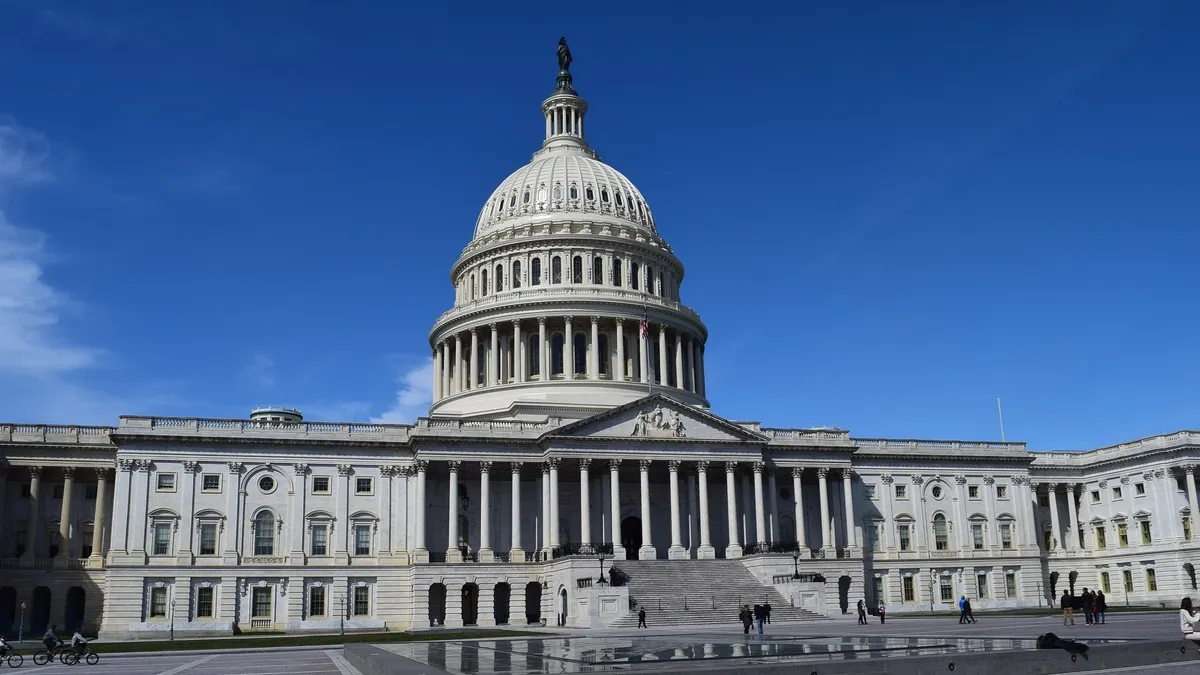Dive Brief:
- Bipartisan, bicameral legislation to boost the energy efficiency of homes and commercial, industrial and federal buildings, could save $51 billion on energy bills through 2050 according to new analysis from the American Council for an Energy-Efficient Economy (ACEEE).
- Critics of the bill, however, told a U.S. House subcommittee on Wednesday that more aggressive building codes for energy efficiency could harm housing affordability through "costly and aggressive" requirements on homebuilders. The committee chair also pressed a Department of Energy official on appliance standards that have yet to be updated.
- The most significant portions of the Energy Savings and Industrial Competitiveness Act would modify national building codes to make new homes and commercial buildings more energy efficient, provide retrofitting assistance for schools, and create a program to account for efficiency in the mortgage appraisal and underwriting process for federally-backed mortgages.
Dive Insight:
The energy subcommittee of the House Committee on Energy and Commerce heard discussion on six bipartisan efficiency and energy storage bills Tuesday, but the most contentious moment focused on appliance standards.
Rep. Frank Pallone, D-N.J., chairman of the full committee, repeatedly pressed Under Secretary of Energy Mark Menezes on what the U.S. Department of Energy is doing to update energy standards for appliances — and never appeared satisfied by the responses.
"The question is, are you actually doing anything to promote energy efficiency? You're just talking to me about process," Pallone charged.
Energy efficiency advocates say DOE under President Donald Trump has missed 18 deadlines to review standards. Menezes assured lawmakers "we have full intention of following all of our legal obligations," and said seven standards have been finalized under Trump. But he also said the problem had been "inherited."
By statute, DOE must review each appliance standards once every six years to determine if an update is warranted. If it finds that an update is warranted, it must publish that update within an additional two years, according to Andrew deLaski, executive director at the Appliance Standards Awareness Project.
"When this administration took office, DOE had missed 3 deadlines. That number has now grown to 21," deLaski told Utility Dive in an email.
"It's not a simple thing," Menezes said, defending the administration's work. "There's testing and evaluation and quite a stakeholder process involved. ... You can compare our record to any prior administration in getting these out."
The rest of the hearing was less charged, though Menezes did hint at potential disagreement with some of the legislation being proposed. In particular, discussion focused on the bill to change the national building code.
"This is a very comprehensive bill and quite creative," Menezes said. "The art will be in the drafting."
In the Senate, the bill was sponsored by Sens. Jeanne Shaheen, D-N.H., and Rob Portman, R-Ohio. The House companion was sponsored by Reps. Peter Welch, D-Vt., and David McKinley, R-W.Va.
Along with building codes, the legislation would encourage efficiency technology and processes for industrial applications, expand DOE's Industrial Assessment Centers, and incentivize the use of more energy-efficient electric motors and transformers.
"We don't do everything that is in the bill," Menezes said. "The rebates would be new. It is significantly broad, that we are continuing to look at the bill ... From personal experience, it is the kind of bill that would fit in well with a comprehensive view."
Menezes, earlier in the hearing, told lawmakers that Sens. Lisa Murkowski, R-Alaska and Joe Manchin, D-W.Va., have indicated to him they may be introducing a comprehensive energy bill later this month in the U.S. Senate Energy and Natural Resources (ENR) Committee. He also said the Trump administration has not taken a formal position on the any of the bills, though it has provided some technical assistance in drafting.
A spokesperson for the ENR committee Grace Jang confirmed that comprehensive energy legislation could be coming later this month.
The bills in front of the subcommittee Tuesday drew both support and concern.
The National Association of Home Builders has "strong opposition" to the efficiency bill, according to Arn McIntyre, president of McIntyre Builders, who testified on behalf of the association.
The legislation "would harm housing affordability as a result of its mandates for overly costly and aggressive energy efficiency requirements to be included in model building energy codes," McIntyre told lawmakers.
The American Institute of Architects (AIA) warned it would be unable to support the bill if language remains to repeal current requirements to phase out the use of fossil fuels in new and retrofitted federal buildings. That policy, contained in Section 433 of the 2007 Energy Independence and Security Act, has not been enacted.
AIA "strongly opposes this repeal and cannot support the bill with the inclusion of that provision," Julie Hiromoto, a licensed architect and principal of international design firm HKS, told lawmakers. "Energy efficiency and energy sourcing are not a replacement for one another. We must address both."
Broadly, the efficiency bill has strong support from efficiency advocates, said ACEEE Senior Policy Advisor Lowell Ungar. Along with saving billions on energy bills, he said the legislation would cut energy waste by more than 30 quadrillion Btus, "almost the total energy use of U.S. industry in a year."
The bill "has been thoroughly vetted and includes important measures for buildings and industrial efficiency," Ungar told lawmakers. He also said the repeal of the fossil fuel phaseout is partially offset by savings from new energy management provisions, "resulting in a relatively small net energy impact."















